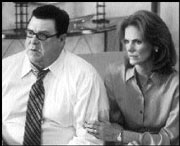STORYTELLING
written and directed by Todd Solondz with Paul Giamatti, John Goodman, and Julie Hagerty opens Feb. 8 at Broadway Market
WATCHING ANY Todd Solondz film since his 1996 Sundance breakout, Welcome to the Dollhouse, is a balancing act. Can you admire his gifts—a diabolically good ear and a not-inconsiderable skill with actors—while ignoring the contempt in which he holds his characters?
Toxic ridicule has been Solondz’s hallmark, yet with Storytelling, only his fourth feature, the approach has begun to feel thin and old. Let’s look back:
Dollhouse was payback time for every slight Solondz had suffered growing up. In it, Dawn, Solondz’s 11-year-old female alter ego (in sync down to their myopia) absorbed every humiliation, in school and out (including a date “to be raped”), out of yearning for the love her parents funneled into her bratty little sister in her damn pink tutu.
With Happiness (1998), the critics’ prize winner at Cannes, Solondz broadened his canvas, deepened his technique, and raised the stakes of how far he could go in seducing/alienating his audience. He showed a certain flinty affection for characters whose tastes ran from obscene phone calls to pedophilia, rape, murder, and dismemberment. He had none for his hapless “ordinary” people: The young woman who gently tried to break off with her nebbishy boyfriend was almost flayed alive by his invective.
Now, running a slight 83 minutes, Storytelling is a step backward from the intricate interlinking of Happiness. Meanwhile, Solondz’s targets remain the same: smugness, self-delusion, and nearly all of affluent suburban New Jersey. Told in two unrelated segments, Storytelling warns that all art, by nature, is unreliable.
THE CURTAIN RAISER, “Fiction,” covers racism and panexploitation, plus really, really bad writing and even worse sex. It’s set in a third-rate college in 1985, where one Mr. Scott (Robert Wisdom), a black Pulitzer Prize-winning writing professor, takes out his fury at his becalmed life by having rough sex with his overawed female students—one after another after another.
His current acolyte is Vi (Selma Blair, Legally Blonde), just tapering off her own affair with Marcus (Lee Fitzgerald, Kids), another class member. Marcus, who has cerebral palsy, has turned their affair into an excruciating story that he reads to the class. Their reverent comments, placing his writing in a category with other “afflicted” writers from Borges to John Updike (“He has psoriasis!”) is more than Scott can stand. His demolishes the story and Marcus in the process.
A caustic roundelay follows: brutal sex, more confessional writing, and exploitation on every side. This is Solondz at his least artful, reveling in his utter un-PC-ness. (It’s worth wondering whether the big red rectangle effectively censoring the combatants in the sex scene is there simply to save the movie’s R rating or as the director’s deadpan commentary.)
The second story, “Non-Fiction,” is Solondz, disingenuous. Six years of being called on his misanthropy seem to have taken their toll. His rebuttal is incarnated by this chapter’s most dangerous failure, Toby (Paul Giamatti, Private Parts), a would-be documentary filmmaker of breathtaking banality and ineptitude. Toby as interpreter of anyone’s life is a terrifying idea, but, you see, he means well. And here he’s clearly Solondz’s stand-in.
Sure, Toby’s film, American Scooby, trashes its subject: a sweetly dim high-school senior (Mark Webber) with no ambition beyond, somehow, becoming Conan O’Brien’s sidekick. It unblinkingly portrays Scooby’s parents (John Goodman and Julie Hagerty) as crass materialists, and everyone else—down to the family’s put-upon Salvadorian maid—as unenlightened and hilarious. But that’s who they are, aren’t they? That’s what a real filmmaker does, isn’t it?
Audiences, obviously, will decide for themselves. For some, Storytelling‘s laughs come at too high a price: not only Marcus and Scooby, but possibly also the better part of ourselves.








